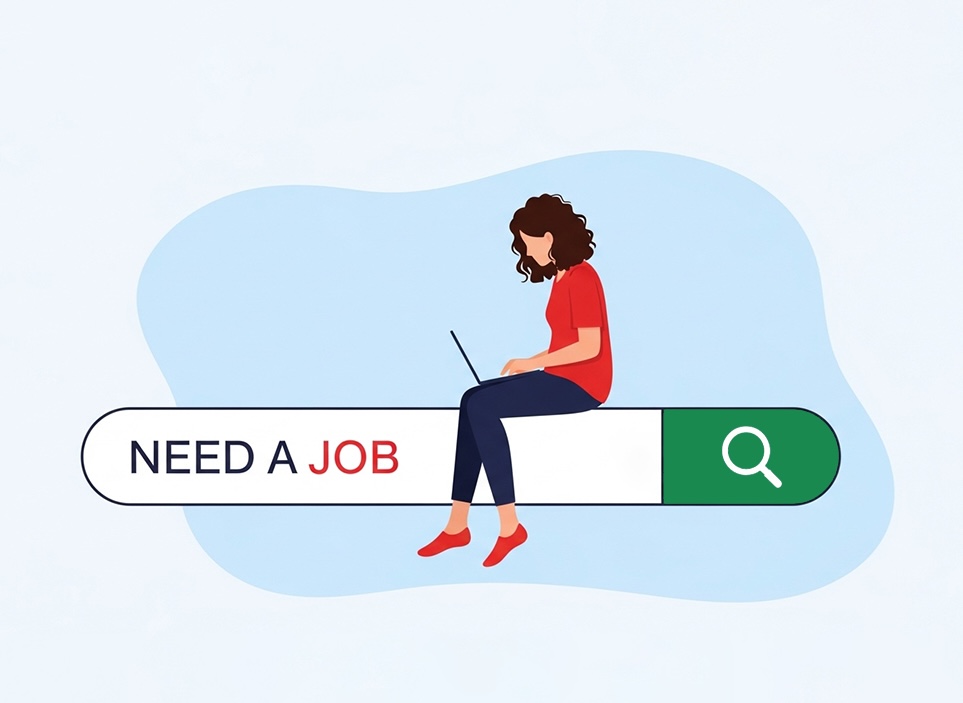If you're struggling to land interviews, second-guessing your resume layout, or wondering why that third follow-up email still went unanswered - welcome to the 2025 job hunt. You're not imagining it: getting a job today is more exhausting, more algorithmic, and more emotionally draining than ever before.
In 2025, hiring is no longer just about experience or education. It's about visibility in a sea of sameness, AI‑readability, and yes, a healthy dose of timing and luck. Recruiters are fielding more applications, while companies, burned by years of over-hiring and layoffs, are moving cautiously. Many roles sit unfilled for months as orgs reevaluate their headcount strategy. Others get posted only after the position has already been internally promised to someone else.
And if it's any consolation – or maybe not, depending on how you look at it – you're not alone in this endeavor.
According to statistics compiled by Glassdoor for employers, it's revealed that an average of about 250 resumes are sent for every corporate job vacancy in the U.S. The numbers further indicate that out of those 250 applicants, only 4 to 6 people will get called for an interview. Those are not encouraging figures, but then again, it will hardly come as a surprise. After all, with the rising number of graduates every year, the demand for jobs will just continue to increase. This just means that you can't simply waltz into your job application and expect to get an offer; you have to prove you're prepared, on paper and in person.
Market reality in 2025: Why getting a job feels so hard
If you’ve been applying to jobs and getting ghosted or stuck in endless rounds of interviews with no offer, you’re not imagining things. Getting a job in a competitive job market in 2025 is a very different experience from what it was pre-COVID. Here are four major shifts shaping today’s job search landscape and what they mean for your job hunt.
Sluggish hiring and the fading power of degree

One of the most frustrating realities of how to get a job in 2025 is the painfully slow hiring cycle. What used to take a couple of weeks can now drag on for two to three months (six months is what most recruiters recommend to be prepared for), sometimes longer. Roles remain open as companies “wait and see,” stretch internal resources, or quietly backtrack on hiring altogether. It’s not uncommon to see job postings vanish overnight without explanation.
Add to this a growing mismatch between what employers say they want and what they actually look for. A decade ago, a degree from a good school might have opened doors. Today, it means less and less. Employers increasingly want proof of skills, not just diplomas. Certifications, portfolios, and demonstrated experience (even from freelance or self-initiated projects) carry more weight than a degree alone.
In fact, many hiring managers now view traditional degrees as lagging behind the real world. AI tools, digital collaboration platforms, and data literacy are core to most roles, yet universities struggle to keep up with the speed of change. If you’re wondering how to get a job without a fancy alma mater, focus on learning and showcasing the skills that matter now, especially if your target field is tech, marketing, finance, or product development. Invest in continuous learning through bootcamps, Coursera certificates, or micro-credentials tied to your field.
The ATS trap: Facing the robots first
If your resume never seems to land you interviews, the problem may not be your qualifications; it might be the Applicant Tracking System (ATS). These are the AI tools used by most companies to sort, scan, and rank incoming resumes. Before a human even sees your application, a machine is deciding whether it fits the job description.
Most ATS platforms scan resumes for keywords, job titles, and formats that align with the job post. If your resume is too creative, too vague, ages you, does not mention your location, or is just not keyword-rich enough, you’ll get filtered out automatically. This has led to a frustrating paradox: even qualified candidates are being rejected before a human recruiter lays eyes on their applications.
There’s a silver lining, though. Job seekers who tailor their resumes by mirroring the job description, using action-oriented bullet points, and embedding industry-relevant keywords are seeing results. A recent 2025 Business Insider feature told the story of a job seeker who landed 12 interviews in 80 days, not by rewriting their experience but by restructuring their resume with a clear, focused layout that aligned with each job ad.
Knowing how to get noticed in a competitive job market means learning how to write for both robots and humans. Your resume needs to be optimized for the ATS and still engaging for the recruiter who eventually reads it.
Network > merit: Why referrals rule
Here’s a tough pill to swallow: in many industries, what matters more than your resume is who you know. While merit and experience are crucial, referrals remain one of the most effective ways to bypass crowded job portals and get straight to an interview. In 2025, internal referrals are often prioritized before a job is even publicly listed.
The data backs this up. LinkedIn reports that applicants with referrals are four times more likely to get hired. Why? Because referrals reduce risk. If a trusted employee recommends someone, it gives hiring managers confidence, even before the resume hits their inbox.
This is especially true in oversaturated industries like marketing, design, early-career tech, and business operations. In these fields, each opening might attract hundreds of qualified applicants. But when one candidate comes with a glowing internal referral, they jump the line.
The challenge for many is building a network from scratch, but networking today doesn’t mean suddenly attending awkward Zoom mixers or sending hundreds of generic LinkedIn connection requests. Instead, it’s about offering value - commenting on industry posts, asking insightful questions, sparking conversations, or requesting short informational interviews with professionals in your target companies. Be genuinely curious and warm, and bring value to whoever you engage.
Stop relying only on job boards and learn how to network intentionally - who knows, you might even make a friend or two.
Gen Z sisillusionment and the rise of micro‑roles
For new grads, the job market is especially disorienting. Many Gen Z job seekers feel underprepared for what the real hiring world expects. Career services at many universities still push outdated advice: dress up, write a formal cover letter, and follow up politely. But they often fail to teach how to optimize LinkedIn, how to navigate ATS, or how to build a personal brand online.

This gap has led to frustration and, in some cases, resignation. Youth unemployment is on the rise again in 2025, especially in competitive entry-level roles. In response, many recent graduates are turning to micro‑roles - short-term internships, part-time freelance work, or even self-initiated projects - to gain experience and credibility.
The good news? These small gigs can be resume gold. Employers don’t care if your experience came from a 3-month unpaid consulting role or a side hustle, as long as it taught you real, relevant skills. A growing number of companies now favor candidates with proof-of-work portfolios over those with vague internships and generic experience lines.
Platforms like Forage, MicroInterns, and even LinkedIn’s new Project Showcase feature are helping Gen Z build digital proof of their abilities and stand out even without a long resume.
If you're early in your career and wondering how to get a job, think outside the box and create your own momentum.
Today's job market is tough - hundreds of LinkedIn and Reddit posts are talking about how tedious and frustrating the job search process is now, speak for themselves - but it’s also full of opportunity for those who adapt. Getting a job is about understanding the system, optimizing for it, and playing the long game.
If you’re serious about learning how to land an offer in a competitive job market, it’s time to move beyond outdated strategies. Invest in skills, write for robots (AI-powered ATS) and humans, nurture your network, and build a proof-of-work resume that shows (not just tells) what you can do.
Want expert help cutting through the noise? Professional resume writers from Resumeble can help craft a strategy that balances human impact with algorithmic success because in 2025, you need both.
How to get a job in a competitive market (2025 Edition)
If you've been applying for jobs, hearing nothing back, and wondering what you're doing wrong, you're not alone. The rules of getting a job have changed, and they've changed fast. What worked five years ago doesn't necessarily work today. But if you understand the new dynamics, you can adjust your strategy and stand out, even in a crowded market.
Here's a breakdown of what actually moves the needle in 2025, and how to put each principle into action.
Skills over degrees - define & showcase
While education still matters, employers now prioritize skills and outcomes. They want to know what you can do, not just what you studied.
To get hired today, you need to demonstrate job-readiness, which often means having up-to-date skills in AI tools, data literacy, project management, or niche areas like ESG compliance or cybersecurity (depending on your industry). These skills can be gained through online certifications, self-initiated projects, or even short-term volunteer work.
Just as importantly, employers are looking for soft skills like adaptability, emotional intelligence, and strong communication. These don't always show up in a degree but can be reflected in how you talk about challenges you've overcome or projects you've led (this is where writing a cover letter might be useful).
Master resume keywords
No matter how skilled you are, your resume needs to make it past the robots.
Most companies today use Applicant Tracking Systems to filter resumes before a recruiter ever sees them. This software is designed to compare the content of a resume against the job description and prioritize those applications that are the closest match. Sidenote: if your candidacy does not match the job post by at least 90% (lacking specific tech skills, degree, or length of experience, for instance), do not waste your time applying and redirect your energy elsewhere.

Here is how to pass the ATS in 2025:
- Copy the job post's exact job title in your resume header.
- Match keywords and phrases from the job posting (e.g., "cross-functional collaboration," "Python automation").
- Avoid overly creative formatting (this includes sidebars, images, graphs, icons, or photos). Stick to clear, scannable layouts.
- Focus on quantifiable metrics in your bullet points (e.g., "Reduced onboarding time by 40% by creating new SOPs").
Much like today's SEO optimization, resume optimization is not about stuffing keywords into a document. It's about mirroring the language the company uses to describe their ideal candidate while being truthful about your own capabilities.
If you're not sure where to begin, Resumeble's certified resume writers are experienced in crafting resumes that balance ATS optimization with human readability. No fluff, just results.
Apply smartly - balance quality with volume
One of the most common mistakes job seekers make is either applying to 100 jobs a week with no customization or obsessing over one application for hours and applying to only two roles a month. Neither extreme works in this case.
The sweet spot would be 5 to 10 well-targeted roles per week, each with:
- A tailored resume
- A short, specific cover letter or email pitch
- A thoughtful application that demonstrates you understand the company and respect the recruiter's time
By tracking which types of applications get responses (and which don't), you can fine-tune your strategy over time. Don't rely on luck and treat your job search like a data-driven campaign. A simple Excel spreadsheet will do just fine.
Start networking today
In 2025, referrals are still very powerful. Internal employee referrals often get reviewed first and may even fast-track you to an interview. Start networking today, even if you are happily employed. You will look much more credible reaching out to an established contact asking for a warm intro to a recruiter than randomly adding the person to your network while already in an active job search.
So, how do you start networking? Identify potential contacts who work at your target companies, ideally in roles adjacent or similar to yours (maybe, senior to your current position?). Then:
- Connect with them on LinkedIn - a short, personal note is optional, but it is a plus if you can word it nicely.
- Engage with their content or posts for a few days (likes, comments).
- When the time comes, reach out with a short message.
Don't get discouraged if you don't receive a reply. It doesn't mean "they hate you" - they are probably just busy and will get to your message when the time is right.
This approach is respectful, specific, and opens the door to natural conversations, not cold pitches.
Build real-world experience
Don't wait for a job to give you experience; create your own, especially if you're early in your career or pivoting industries.
In 2025, hiring managers care far more about what you've built, solved, or contributed to than whether you held a formal title. That means:
- Launch a simple project related to your field.
- Volunteer for a nonprofit and help with real deliverables.
- Offer to help a small business or startup for a few hours a week.
- Join a hackathon or digital challenge relevant to your role.
Even short-term, unpaid, or self-directed experiences can be presented on your resume as long as they show growth and relevant skills.
Be sure to describe these experiences with action-oriented language and real outcomes, just like you would for a paid job.
Continuously upskill
The most successful job seekers in 2025 are the ones who keep learning, even while they're applying. This doesn't have to mean enrolling in expensive bootcamps. Start with focused, high-impact upskilling: learn how to use tools like ChatGPT, Notion, Airtable, or Tableau and get certified in areas like project management, basic AI fluency, or Excel automation.
Job hunt roadmap
1) Update your resume
- Audit your current document. Is it keyword-optimized? Easy to scan? Too long? Too short?
- Identify your strongest skills (both technical and soft) and prepare examples.
- Write a brief, compelling professional summary (skip an objective statement).
2) Upgrade
- Choose 1–2 key certifications or tools to learn this month.
- Join a free course or challenge to build new knowledge.
- Document your learning: blog, journal, or portfolio project.
3) Apply
- Apply to 5–10 roles per week with tailored applications.
- Keep track of roles, responses, and follow-up reminders.
- Create a simple "application toolkit" with resume, templates, and proof-of-work links.
4) Network
- Reach out to 3 people per week in your target companies or industries.
- Send genuine questions or comment on their posts to spark conversation.
- Engage regularly on LinkedIn or in niche communities related to your field.
5) Get help If you're stuck
- If your resume isn't getting callbacks, consider professional help.
Resumeble's resume writers specialize in building ATS-friendly, high-impact resumes tailored for today's job market. Your experience deserves to be seen, and hiring managers won't notice it if it's buried behind outdated formatting or unclear phrasing.
Getting a job in a competitive market doesn't mean you have to out-hustle everyone else. It does mean, though, that you need to play smarter and be more strategic and more focused. By aligning your resume with what employers actually want, showing proof of your skills, and networking before you need something, you'll create endlessly more opportunities than you ever could by endlessly clicking "Apply Now."
You've got this! And if you need help along the way, Resumeble is always here to help you level up your job search with personalized, professional support.
Adapting to economic ups & downs

The job market in 2025 is anything but predictable. Industries rise and fall quickly: tech is slowing, while healthcare, climate tech, and clean energy are on the rise. If you want to stay employable no matter what the economy does, adaptability in its widest sense of the word is your greatest asset.
Be willing to pivot
You don’t need to abandon your current career trajectory if you think it is going great, but you should be prepared to transfer your skills into new sectors (especially if you are in secretarial positions, design, or coding - think "threatened by AI").
Example: if you’re a laid-off project manager from a SaaS startup, look at roles in education tech, renewable energy, or even healthcare administration. Many skills, like communication, planning, and budgeting, translate more easily than you think.
Start by identifying parallel industries where your skills are in demand, then read a few job descriptions to see what gaps you may need to fill (these will often mean getting a few certifications and learning new tech).
Practice career cushioning
“Career cushioning” means proactively protecting your professional future, even if your current job feels stable. Here’s what it looks like in practice:
- Upskill strategically: Don’t wait for a crisis to learn something new. Take one short course per quarter in a relevant tool or trend (AI, data analysis, automation, etc.).
- Network regularly: Keep in touch with past colleagues. Follow industry leaders. Send a “just checking in” message every couple of months to key contacts.
- Build a financial buffer: If you can, set aside a few months of living expenses. Job search now can last as long as 6 months, so having some savings to fall back on will reduce stress if you suddenly find yourself between jobs.
- Track your wins: Keep a personal record of your accomplishments. It’ll make updating your resume and preparing for interviews much easier.
Staying resilient is not about never getting knocked down; it is about mastering the tools, skills, and network to bounce back quickly (and learn from your mistakes).
